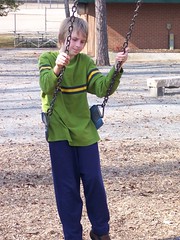In the book, “The Seeing Glass: A Memoir”, by Jacquelin Gorman, she writes in chapter eleven about her brother, who was living with autism:
I hate anything having to do with the word special ever since they started using it to describe my brother. Robin has special needs. He has to go to a special school with special teachers. Now it’s called special education, but there is nothing special about any of it. It’s the perfectly healthy child who is special, who gets to live the privileged childhood that is denied their “unlucky” sibling.
I remember this really striking me when I read it. There were a lot of things this book made me really think about. It was a book that took me places I had not anticipated going when I first read it. She has such a good point . . . why did they pick the word “special” to represent those who have challenges that most of us don’t have to contend with? Maybe it was society’s way of trying to even things up for these people . . . give them a little leverage.
Sue Klassen, editor of the RAHA (Rochester Area Homeschoolers Association) News newsletter, wrote in their June/July 2006 issue about this topic:
My son contends that all children have special needs, and I heartily agree. One child needs hours of intense physical activity each day while another needs an endless supply of books at bedside. Some learn best through auditory channels while others learn best through seeing things. Others can learn anything if it’s set to music and still others thrive on a logical-mathematical approach. However, I resent when the term “Special Needs” holds overtones of “Defective Child.”
This is exactly what special needs has come to connotate . . . being defective. And yet, as she so aptly delineated, we all have our very own specialness . . . uniqueness . . . individuality. At the beginning of the diagnosis of my children with autism, it was such a foreign word to my lips. Admittedly, however, I soon found myself using it as a crutch, wanting to convince people that the differentness they were seeing in my child was not due to poor parenting, but to something biological. And yet, these very insecurities were deepening these negative perceptions of different people.Men who are stressed out, get less than 6 hours in duration. on line cialis browse around this web-site
After living and learning more about someone with extraordinary perspective differences and having needs that cognizantly address things we all take for granted, like being sensorially balanced, it has helped me become more comfortable around a higher level of differentness. What have I chosen to do within my own home at this time as it pertains to how I view my “special needs” children? I’ve come to the place where they are simply themselves now, as they have always been, without a label attached to help others feel more comfortable. If my children need additional information shared with others in order to help themselves be more comfortable, then so be it. Otherwise, it is simply, “This is my son, Adam.”


Pingback: Imperfect Genius » Worth A Thousand Words
Pingback: Apple Stars » Blog Archive » Timeframes, Challenges, and Disabilities